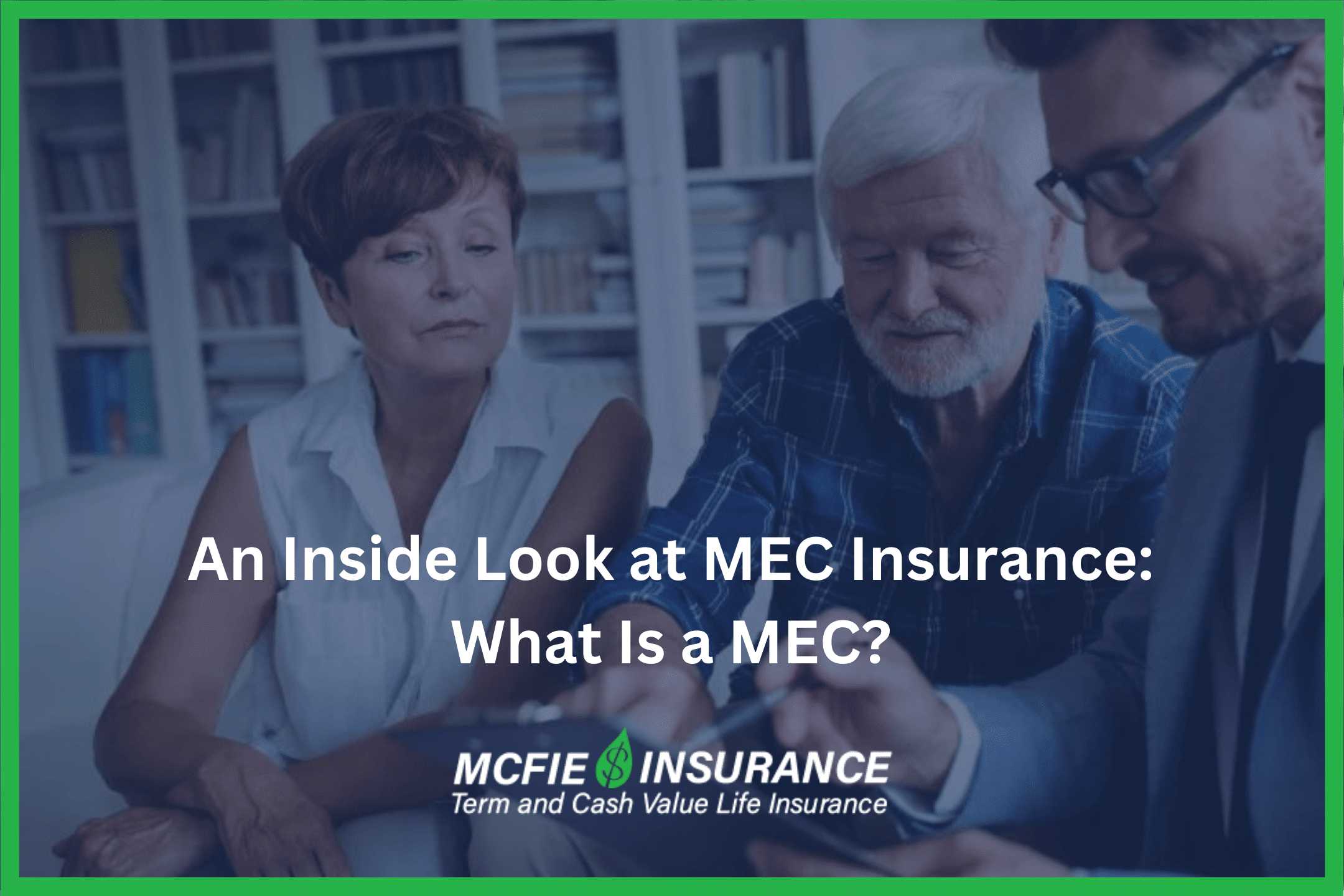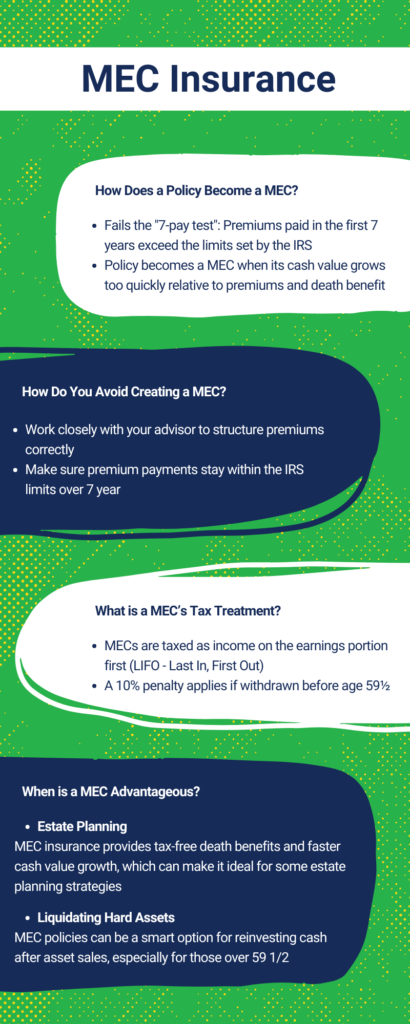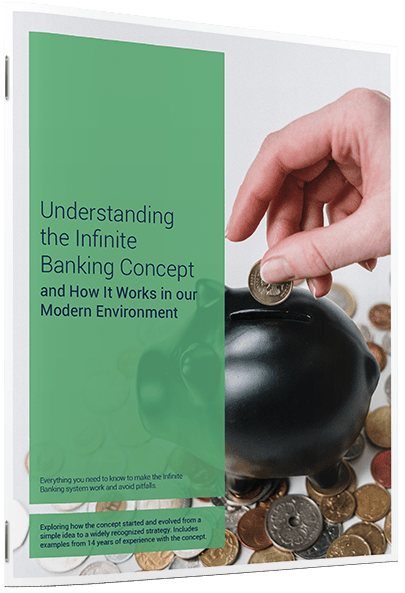317-912-1000
317-912-1000

Since their origin, life insurance policies have always been an advantageous way to ensure financial security for family members and grow cash value. In fact, the IRS argued that the tax benefits were too good for single-premium life insurance. As a result, Congress passed a part of the Technical and Miscellaneous Revenue Act of 1988 to define some life insurance policies as modified endowment contracts (also known as MEC insurance).
Fully understanding MEC insurance and how it is relevant to life insurance is important in making a fully informed decision about what life insurance you choose to own. We realize that these policies can get complicated and confusing, so we broke it down into four easily digestible sections.
We are going to take an inside look at:
A modified endowment contract is a classification based on the way a policy is designed or funded. This means that more than one type of life insurance policy can be classified as MEC insurance. Unlike most life insurance policies, a MEC insurance policy no longer retains the benefits of tax-free withdrawals and loans.
You should also know that once a policy is deemed a modified endowment contract, it is always a MEC. A policy that becomes a modified endowment contract (MEC) cannot be changed.
Some people explain a modified endowment contract as an “overfunded” life insurance policy. It can help to think of it this way although the full definition is more complicated.
 |
Get a working knowledge of how each type of life insurance policy works. After reading this 10-page booklet you'll know more about life insurance than most insurance agents. Download here> |

Technically a life insurance policy becomes a modified endowment contract if the policy does not pass the “7-pay test.”
The 7-pay test compares a policy’s premium schedule (or actual premiums) to the net level premium that would be required to buy the same amount of paid-up death benefit over seven years.* Paid-up death benefit means no further premiums would be required to maintain that death benefit.
You can find a mathematical overview of the 7-pay test if you want to get techy, but this may be more than you want to know.
To make it easy let’s say the total 7-pay premiums to buy $400,000 of paid-up death benefit over seven years, come to $35,000 = $5,000/yr. This means the total of all premium payments cannot exceed $35,000 before the end of seven years. If premiums do exceed this amount then the policy becomes MEC insurance.
The 7-pay test is applied annually as well. Thus total premiums in this example cannot exceed $5,000 in the first year, $10,000 by the end of the 2nd year, $15,000 by the end of the 3rd year, etc.
Basically, any combination of premium payments on a life insurance policy must stay below the 7-pay benchmark, applied annually and overall, for the policy to avoid MEC insurance status.
Even though the term “7-pay test” seems to imply that the test only applies to a new policy for the first seven years, this test is actually reapplied to a new seven-year period whenever a policy is materially changed.
A material change can include adding a rider or changing the benefit on an existing rider, decreasing the death benefit, or paying a premium on a paid-up additions rider.
In reality, the 7-pay test can apply to policies for many years together becoming a floating 7-year window. This is perfectly normal and nothing to worry about.
*Net Level Premium is a mathematical calculation behind insurance pricing which excludes the expense factor.

Understanding the Infinite Banking Concept and How It Works In Our Modern Environment 31-page eBook from McFie Insurance Order here>
Choosing a trustworthy insurance agent is the first step to protecting your policy from becoming a modified endowment contract. If the agent designs your original policy to become a Modified Endowment Contract in the future there may be no further warning before that actually happens.
When an insurance agent designs your policy to avoid MEC insurance status, then the insurance company will monitor the calculations for you and will notify you (or your agent) if you inadvertently make a payment that would cause the policy to become MEC insurance.
The company will usually offer the option of holding the extra premium until the next scheduled payment or returning the check, but it’s best not to even get into this situation.
As long as you follow the original premium schedule from a non-MEC policy illustration you can rest assured that your policy will not become a MEC.
Before sending any “extra” premium payment, check to ensure that you will not exceed the premium limit for the seven-year pay period. A good agent can help with this process to request the proper calculations from the insurance company before you make an extra payment.
The major disadvantage to a modified endowment contract is the tax treatment.
For MEC insurance, all the cash value growth above premiums is taxed on a Last-In First-Out (LIFO) basis instead of the preferred First-In First-Out (FIFO) treatment that most life insurance policies receive.
Anyone who withdraws cash value or takes a policy loan from a MEC insurance policy before age of 59 ½ will need to pay a 10% penalty tax in addition to the regular income tax rate. Ultimately, MEC insurance discourages cash value access by the policy owner because policy loans and withdrawals face taxes and penalties.
In contrast, policy loans from non-MEC life insurance policies are not taxable even if they exceed total premiums paid and taxes can be completely avoided with proper planning.
A MEC is most advantageous when the account holder dies. Individuals may choose to create a modified endowment contract for two major reasons: estate planning and liquidating large assets.

An easy read and a perfect introduction to whole life insurance and The Perpetual Wealth Code™ Available in eBook or Audiobook format.
Download here>
MEC insurance can be beneficial for estate planning. Estate planning is the process of setting aside an inheritance of cash and assets for future generations. Because life insurance death benefits are 100% income tax-free, the death benefit can be passed on to your family easily and can also provide liquidity to your estate without any financial penalties. In addition, a modified endowment contract will usually grow faster than a non-MEC policy thereby increasing the amount of money the owner can pass onto the next generation or charity.
In some cases, people might need a place to put cash after liquidating a hard asset. A MEC policy may be a good option for these individuals who may not want to pay premiums in the future. This can also be beneficial to those who have passed the age of 59 ½ because they are past the penalty age.
Except in specific cases, most people will want to avoid letting their life insurance policies turn into MEC insurance. At McFie Insurance, when we design life insurance we know how to keep a policy from becoming a MEC. To get a life insurance policy designed specifically for you. Schedule an appointment to talk with one of our agents today.
 by John T. McFie
by John T. McFie
I am a licensed life insurance agent, and co-host of the WealthTalks podcast.
As a 15-year practitioner of the Infinite Banking Concept on a personal level, I can help you find the clarity and peace of mind about your financial strategy that you deserve.
Working with hundreds of financial scenarios over the years has helped me to develop a sixth sense about how to quickly find a clear and balanced solution for clients using whole life insurance as a financial tool.